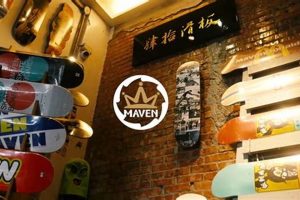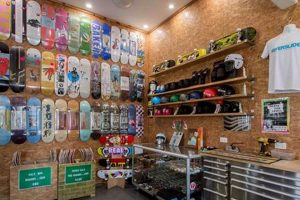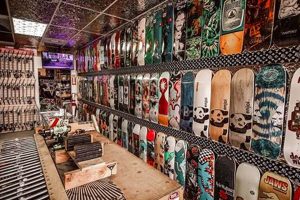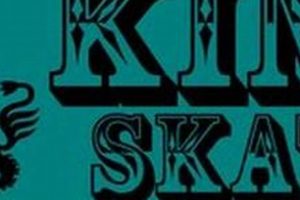An establishment specializing in skateboarding equipment and apparel serves the needs of skateboarders, ranging from beginners to professionals. These retail locations typically offer a variety of products, including skateboards, trucks, wheels, bearings, and protective gear, as well as clothing and footwear designed for skateboarding. For example, a customer might visit such a store to purchase a complete skateboard setup or to replace worn-out components.
The availability of specialized retailers is crucial to the skateboarding community. These shops provide expertise and guidance, assisting individuals in selecting the appropriate equipment for their skill level and style. Historically, these locations have also served as community hubs, fostering connections among skateboarders and promoting the sport. The presence of such outlets contributes to the growth and accessibility of skateboarding.
The following sections will delve deeper into the specific offerings, community impact, and evolving trends associated with these retailers. This exploration will provide a comprehensive understanding of their role within the broader skateboarding landscape.
Skateboarding Equipment Selection
Optimizing the skateboarding experience necessitates careful consideration of equipment selection. This section offers guidance applicable to both novice and experienced skateboarders seeking enhanced performance and safety.
Tip 1: Deck Selection Based on Riding Style: Deck width and length should correspond to the intended riding style. Wider decks generally offer greater stability for vert and park skating, while narrower decks facilitate easier street maneuvers.
Tip 2: Truck Compatibility and Performance: Truck width must align with the deck width to ensure optimal board control. Consider truck height based on wheel size and intended use; higher trucks may be necessary for larger wheels to avoid wheel bite.
Tip 3: Wheel Durometer for Terrain: Wheel durometer, measured on the A scale, indicates hardness. Softer wheels (lower durometer) provide better grip and smoother rides on rough surfaces, while harder wheels (higher durometer) offer increased speed and slide capability on smooth surfaces.
Tip 4: Bearing Precision and Maintenance: Bearing ABEC rating indicates manufacturing precision. Higher ABEC ratings generally result in smoother, faster rides. Regular cleaning and lubrication of bearings are crucial for maintaining performance and longevity.
Tip 5: Protective Gear Prioritization: Helmets, knee pads, elbow pads, and wrist guards are essential for injury prevention. Ensure protective gear fits properly and meets safety standards.
Tip 6: Footwear Considerations: Skateboarding footwear should provide adequate support, grip, and durability. Flat-soled shoes with reinforced stitching are recommended.
Tip 7: Hardware Inspection and Replacement: Regularly inspect all hardware, including nuts and bolts, for signs of wear or damage. Replace worn or damaged hardware promptly to ensure board integrity.
Adherence to these guidelines promotes both enhanced skateboarding performance and improved safety. Careful consideration of equipment selection is an investment in the overall skateboarding experience.
The subsequent section will address the historical and cultural significance of skateboarding retailers, providing a broader context for understanding their role within the skateboarding community.
1. Equipment selection
Equipment selection is a cornerstone of skateboarding retail, directly impacting customer experience and performance. The curated inventory and expertise in guiding choices are defining characteristics of a specialized skateboarding shop.
- Deck Variety and Customization
The availability of a diverse range of skateboard decks, varying in size, construction, and concave, allows skaters to tailor their equipment to specific riding styles and preferences. A well-stocked shop offers decks suitable for street, park, vert, and cruising, ensuring customers can find the optimal platform for their chosen discipline. This customization is a key differentiator from generalized retailers.
- Trucks: Performance and Compatibility
Skateboard trucks are crucial for turning and stability. Selection encompasses different axle widths, heights, and turning responsiveness. A specialist shop provides guidance on selecting trucks that are compatible with the chosen deck and riding style, considering factors such as wheel size and intended use. Correct truck selection optimizes board feel and control.
- Wheels and Bearings: Speed and Grip
Wheel durometer and size directly affect speed, grip, and ride smoothness. Offerings range from soft wheels for cruising to hard wheels for park skating and street tricks. Bearing quality impacts rolling efficiency. A knowledgeable retailer can advise on the appropriate wheel and bearing combination to match the rider’s skill level and preferred terrain.
- Protective Gear and Apparel: Safety and Style
The availability of high-quality protective gear, including helmets, pads, and wrist guards, underscores the importance of safety. Specialized skateboarding apparel offers comfort, durability, and functionality. A shop focused on skateboarding prioritizes both safety and style, providing customers with a comprehensive selection of protective gear and clothing designed for skateboarding.
These facets of equipment selection, ranging from deck customization to safety gear provision, highlight the specialized role of skateboarding retailers. The ability to offer tailored guidance and curated inventory differentiates these establishments and contributes to a positive skateboarding experience for customers of all skill levels. This comprehensive approach to equipment contributes significantly to the retailer’s value proposition.
2. Community Hub
The skate shop serves as more than just a retail outlet; it functions as a community hub, fostering connections and providing a physical space for skateboarders. This role stems from the specialized knowledge and shared passion found within the shop, attracting individuals seeking expertise, camaraderie, and a sense of belonging. The impact is twofold: the shop gains customer loyalty and a reputation as a reliable resource, while skateboarders benefit from a supportive environment and access to a network of like-minded individuals. For example, a shop might host group skate sessions, workshops, or competitions, solidifying its position as a central gathering point for the local skateboarding scene.
The importance of this community aspect extends to the promotion of skateboarding itself. Shops often sponsor local skateboarders, providing them with equipment and visibility, thereby inspiring others to participate. They may also collaborate with local schools or organizations to introduce skateboarding to new audiences. This proactive engagement not only expands the skateboarding community but also contributes to its overall health and sustainability. Without this hub function, skateboarding risks becoming a more solitary pursuit, potentially hindering its growth and accessibility.
In summary, the community hub element is an integral component of a successful skate shop. It enhances customer loyalty, promotes skateboarding, and fosters a supportive environment. The absence of this element can limit the shop’s potential and isolate skateboarders, underscoring the critical role the shop plays in nurturing the local skateboarding scene. By actively cultivating this community, a skate shop secures its position as a vital resource and a driving force within the skateboarding world.
3. Expert Advice
The provision of expert advice is a crucial differentiator for a skateboard retailer. The expertise disseminated impacts purchasing decisions, safety practices, and skill development, all of which contribute to the overall success and customer satisfaction associated with the establishment. For instance, an individual may enter a shop seeking guidance on selecting a skateboard deck appropriate for their height and weight. A knowledgeable staff member can assess their needs, discuss the merits of different deck sizes and concaves, and recommend a suitable product. This specialized assistance elevates the customer experience beyond that of a general sporting goods store, where such personalized guidance may be lacking. The effect of such expertise is a well-informed customer who is more likely to make a purchase aligned with their specific requirements, reducing the likelihood of dissatisfaction or injury.
The importance of expert advice also extends to the realm of skateboard maintenance and repair. Skateboarders routinely encounter issues with their equipment, such as loose trucks, worn-out bearings, or damaged decks. A skate shop with experienced staff can offer advice on troubleshooting these problems, performing necessary repairs, or recommending appropriate replacement parts. Furthermore, demonstrations or workshops on topics such as bearing maintenance or grip tape application can enhance customer knowledge and skill. This type of value-added service fosters customer loyalty and reinforces the shop’s role as a trusted resource within the skateboarding community. Without this specialized guidance, skateboarders may resort to trial-and-error methods or rely on potentially unreliable online sources, increasing the risk of equipment damage or personal injury.
In summary, expert advice is not merely an ancillary service provided by a skate shop; it is a fundamental element that contributes to its value proposition and community standing. The ability to provide informed guidance on product selection, maintenance, and safety practices sets a specialized retailer apart from general merchandise stores. By fostering customer knowledge and skill, a skate shop reinforces its position as a trusted resource and contributes to the overall health and sustainability of the local skateboarding scene. The challenges lie in maintaining a high level of expertise among staff and adapting to evolving product technologies and skateboarding trends. However, the benefits of providing expert advice far outweigh the difficulties, making it an essential component of a successful skateboarding retail business.
4. Brand Variety
A diverse brand selection within a skateboarding retail environment, often referred to as a “push skate shop,” directly influences customer choice and satisfaction. The availability of multiple brands allows consumers to compare product attributes, pricing, and aesthetic designs, fostering competition and driving innovation within the skateboarding industry. For instance, one shop might carry decks from established brands known for their durable construction alongside decks from smaller, independent brands recognized for their unique artwork. This variance caters to different skater preferences and budgets, increasing the shop’s appeal to a wider customer base. Without a robust brand offering, a shop risks limiting its customer reach and potentially losing sales to competitors with more extensive selections.
The presence of diverse brands also provides skaters with options for specialized equipment. Certain brands may focus on specific types of skateboarding, such as street, park, or longboarding, each requiring different board shapes, wheel durometers, and truck configurations. A shop that offers a wide array of brands can cater to these specialized needs, providing customers with the opportunity to optimize their equipment for their chosen discipline. Furthermore, brand variety provides opportunities for collaboration and exclusive product releases. Shops often partner with brands to create limited-edition products, attracting customers seeking unique and collectible items. For example, a shop might collaborate with a local artist and a skateboarding brand to produce a limited run of decks featuring original artwork, thereby appealing to both art enthusiasts and skateboarders alike.
In summary, brand variety is a crucial component of a successful skateboard retail environment. The availability of diverse brands allows consumers to make informed choices, optimizes equipment for specific skateboarding styles, and fosters collaboration and exclusivity. The challenges involved in maintaining a wide brand selection include managing inventory, building relationships with multiple suppliers, and staying abreast of emerging brands and product trends. However, the benefits of a diverse brand offering far outweigh the costs, making it an essential factor in attracting customers, fostering customer loyalty, and ensuring the long-term viability of the shop.
5. Local Events
Local events are integral to the function and presence of a “push skate shop,” contributing significantly to community engagement and commercial viability. The events serve as direct extensions of the shop’s brand and values, solidifying its position within the local skateboarding scene.
- Skate Competitions and Demonstrations
Skate competitions, sponsored or hosted by the shop, provide a platform for local skateboarders to showcase their skills. These events often draw significant crowds, increasing visibility for both the shop and participating skaters. Prizes, typically merchandise from the shop or sponsored brands, incentivize participation and further promote the business. The competitive atmosphere fosters camaraderie and encourages skill development within the community.
- Workshops and Instructional Sessions
Workshops focused on skateboarding techniques, board maintenance, or customization can be offered by the shop, providing value beyond retail sales. These sessions attract individuals of varying skill levels, generating foot traffic and positioning the shop as a source of expertise. Instructors may be shop employees or sponsored skaters, further integrating the shop within the community. This educational aspect can appeal to newcomers and help retain existing customers.
- Community Clean-Ups and Advocacy
Shops can organize community clean-up events at local skateparks or skating areas. This demonstrates a commitment to the skateboarding environment and fosters a sense of responsibility among participants. Advocacy for skatepark improvements or the creation of new skating spaces further solidifies the shop’s role as a champion for the local skateboarding community. Such initiatives enhance the shop’s reputation and attract environmentally conscious customers.
- Product Launch Events and Brand Promotions
New product releases or brand collaborations can be celebrated with launch events at the shop. These events create excitement and generate sales, particularly for limited-edition items. Representatives from skateboarding brands may attend, providing opportunities for customers to interact with industry professionals. Live music, food, and other entertainment can further enhance the event experience.
These local events, encompassing competitions, workshops, community initiatives, and promotional activities, collectively reinforce the connection between the shop and its surrounding community. They serve not only as marketing tools but also as tangible expressions of the shop’s commitment to the growth and well-being of skateboarding at the local level. The presence of these events is a key indicator of a shop’s success and its integral role within the broader skateboarding ecosystem.
6. Product knowledge
Product knowledge is a cornerstone of successful operation for any establishment specializing in skateboarding equipment and apparel. A comprehensive understanding of the products offered directly influences sales, customer satisfaction, and the overall reputation of the retail outlet.
- Material Composition and Performance Characteristics
Skateboard decks are constructed from various materials, including maple, bamboo, and composites, each exhibiting unique performance characteristics. A knowledgeable staff can explain the differences in durability, flex, and weight associated with each material, guiding customers toward a selection that aligns with their riding style and skill level. For example, a heavier skater may benefit from a deck with a higher ply count for increased rigidity, while a beginner may prefer a more flexible deck for easier maneuverability. This understanding directly impacts customer satisfaction and safety.
- Truck Geometry and its Impact on Board Handling
Skateboard trucks vary in height, width, and turning responsiveness, all of which affect the board’s handling characteristics. Expertise in truck geometry enables staff to assist customers in selecting trucks that are compatible with their deck and riding style. Higher trucks may be necessary for larger wheels to prevent wheel bite, while narrower trucks are often preferred for street skating due to their increased agility. Improper truck selection can negatively impact performance and potentially lead to accidents. Therefore, the expert guidance is crucial.
- Wheel Durometer and Surface Compatibility
Wheel durometer, measured on the A scale, determines the wheel’s hardness and its suitability for different surfaces. Softer wheels (lower durometer) provide better grip on rough surfaces, while harder wheels (higher durometer) offer increased speed and slide capability on smooth surfaces. A well-informed staff can advise customers on the appropriate wheel durometer based on their typical riding environment. Using overly hard wheels on a rough surface can result in a jarring ride and reduced control, while using overly soft wheels on a smooth surface can reduce speed and efficiency.
- Bearing Precision and Maintenance Requirements
Bearing ABEC rating indicates the manufacturing precision of the bearing components. Higher ABEC ratings generally result in smoother, faster rides. However, bearing maintenance is crucial for preserving performance and longevity. A knowledgeable staff can explain the differences between ABEC ratings and advise customers on proper cleaning and lubrication techniques. Neglecting bearing maintenance can lead to reduced speed, increased friction, and premature bearing failure. Therefore, guidance is essential for performance.
These facets of product knowledge, ranging from material composition to maintenance requirements, highlight the importance of expertise within a skateboarding retail environment. The ability to provide informed guidance enhances the customer experience, promotes safe skateboarding practices, and reinforces the shop’s role as a trusted resource within the skateboarding community. A “push skate shop” that invests in developing product knowledge among its staff is more likely to attract and retain customers, ultimately contributing to its long-term success.
7. Skateboarding culture
Skateboarding culture, encompassing values, aesthetics, and communal practices, profoundly influences the operations and identity of establishments specializing in skateboarding retail. These retail locations serve not merely as purveyors of equipment but also as physical embodiments and propagators of skateboarding’s distinct cultural elements.
- Aesthetic Expression and Product Selection
Skateboarding culture values individual expression, reflected in the design and customization of equipment. Retail outlets stock boards adorned with diverse graphics, catering to varied aesthetic preferences. Shops often support local artists, featuring their work on decks and apparel, thereby reinforcing the connection between skateboarding and artistic creativity. The selection reflects an understanding of the culture’s emphasis on self-expression.
- Community Building and Social Interaction
The culture fosters a sense of community through shared experiences and mutual support. Retail locations frequently act as meeting points, providing a space for skateboarders to connect, share knowledge, and plan sessions. Shops sponsor local skateboarding teams and events, further strengthening community bonds and promoting the sport. This community-centric approach is essential to the retail establishment’s long-term viability.
- Independent Spirit and Brand Representation
Skateboarding culture champions independence and authenticity, favoring smaller, skater-owned brands over large corporations. Retail outlets often prioritize stocking products from these independent brands, supporting their growth and reflecting the culture’s ethos. This preference for independent brands aligns with the culture’s rejection of mainstream commercialism and its emphasis on genuine skateboarding passion.
- Countercultural Values and Marketing Strategies
Skateboarding culture, rooted in rebellion and nonconformity, influences marketing strategies employed by retail establishments. Traditional advertising methods are often eschewed in favor of grassroots marketing, word-of-mouth promotion, and social media engagement. The cultures aversion to conventionality shapes the retail environment, emphasizing authenticity and genuine connection with the skateboarding community.
These cultural facetsaesthetic expression, community building, independent spirit, and countercultural valuesare intrinsically linked to the function and success of skateboarding retail locations. The shops not only sell equipment but also actively participate in and perpetuate the culture, thereby solidifying their relevance within the skateboarding landscape. Understanding and embracing these cultural elements is vital for retail establishments seeking to connect with and serve the skateboarding community authentically.
Frequently Asked Questions
This section addresses common inquiries regarding establishments specializing in skateboarding equipment and apparel, often referred to by a specific name. The information provided aims to clarify aspects of their operations and value within the skateboarding community.
Question 1: What distinguishes a dedicated skateboarding retail location from a general sporting goods store?
A specialized retail outlet offers a curated selection of skateboarding-specific products, expert advice tailored to skateboarding needs, and often serves as a community hub for local skateboarders. General sporting goods stores typically lack the depth of product knowledge and community focus found in dedicated skateboarding shops.
Question 2: How important is it for a “push skate shop” to sponsor local skateboarders?
Sponsorship of local skateboarders is a crucial component of a shop’s community engagement and brand building. It provides support to talented individuals, increases the shop’s visibility within the skateboarding scene, and fosters a sense of loyalty among customers.
Question 3: What factors should be considered when selecting a skateboard deck?
Deck width, length, concave, and material composition are all important factors to consider. Width and length should be appropriate for the skater’s size and riding style, while concave affects the board’s responsiveness. Material composition impacts durability and flex.
Question 4: How often should skateboard bearings be cleaned and lubricated?
Bearing cleaning and lubrication frequency depends on usage and environmental conditions. Regular cleaning, typically every few weeks for frequent skaters, removes dirt and debris that can reduce speed and damage bearings. Lubrication with a suitable skateboard bearing lubricant ensures smooth rolling.
Question 5: What role does a “push skate shop” play in promoting skateboarding safety?
These stores promote safety by offering a wide selection of protective gear, providing advice on proper gear usage, and educating customers about safe skateboarding practices. Shops may also organize safety clinics or partner with local organizations to promote skateboarding safety awareness.
Question 6: How do skateboarding retailers contribute to the local skateboarding culture?
They contribute by providing a physical space for skateboarders to connect, sponsoring local events, supporting local artists and brands, and promoting the values of skateboarding culture, such as independence and creativity.
These FAQs aim to provide clarity on the function and importance of establishments specializing in skateboarding. Understanding these aspects can aid in making informed decisions regarding skateboarding equipment and community engagement.
The next section will explore emerging trends and future prospects for skateboarding retail businesses.
Conclusion
This exploration has illuminated the multifaceted role of the dedicated skateboarding retail outlet, “push skate shop”. It has covered equipment selection, community engagement, the provision of expert advice, the curation of brand variety, the organization of local events, the dissemination of product knowledge, and the perpetuation of skateboarding culture. Each of these elements contributes to the function and value of these establishments within the skateboarding ecosystem.
The future viability of “push skate shop” depends on its ability to adapt to evolving consumer preferences, emerging technologies, and the ongoing evolution of skateboarding itself. The continued commitment to providing specialized expertise, fostering community, and championing the spirit of skateboarding will be paramount in ensuring its continued relevance and success. The enduring impact of these establishments extends beyond mere commerce; it shapes the very fabric of skateboarding itself.







